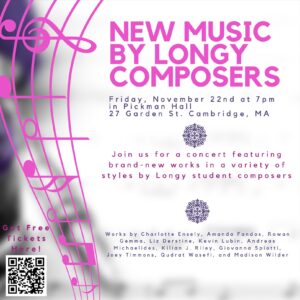
- This event has passed.
Kendra Comstock, Historical Voice Performance | Graduate Student Recital
Saturday • April 24, 2021 | 7:30 pm
The myth of Orpheus and Eurydice begins and ends with tragedy. In Greek mythology Orpheus is regarded as the world’s greatest musician, who could make the rocks and trees move with the sound of his voice or the strike of his lyre. On Orpheus and Eurydice’s wedding day, Eurydice is bitten by a snake and dies. The myth states that Orpheus then traveled to the Underworld to plead for Pluto to release Eurydice. Pluto agrees with the stipulation that Orpheus must lead Eurydice back to the mortal world without looking at her. When they leave the Underworld, at the threshold of the mortal realm, Orpheus turns to gaze at Eurydice, banishing her to the Underworld forever. This myth has intrigued composers throughout history and even day. The myth stays relevant not because of its tragedy, but because of its mystery, as generations attempt to understand Orpheus’ state of mind. Why did Orpheus turn around when he knew the consequence? Was he unable to resist the cries of his love? Or did he travel to the Underworld to lose her a second time as inspiration for his plaintive music? There is no certain conclusion.
However, it was not Orpheus’ journey that drew me to this myth, but Eurydice’s. In this story she is left to suffer for Orpheus’ actions. Did she feel betrayed? Did she even want to be saved? Often Eurydice serves only as a cause for Orpheus’ quest. Orpheus is given a voice, while Eurydice remains silent. This program was created by combining pieces from several Orphean operas to show many interpretations of the myth: L’Orfeo (1607, Monteverdi); Orfeo (1647, Rossi); L’Orfeo (1672, Sartorio); La descente d’Orphée aux enfers (1686, Charpentier); Orpheus (1726, Telemann); Orfeo ed Euridice (1762, Gluck); and one cantata, Orphée (1710, Clérambault). As the myth unfolds in this program, I ask you to consider your own interpretation of Orpheus’ actions. Consider the love of an artist and consider his love. But also consider Eurydice. As I prepared for this performance, I strived to embody every version of Eurydice’s story. Eurydice will finally have her voice.
BIOGRAPHY:
Praised for her “nuance and sensitivity” (Boston Music Intelligencer), soprano, Kendra Comstock, is a Boston-based performer and teacher originally from Hartland, Vermont. Kendra performs a wide variety of Classical and Contemporary repertoire, but is especially passionate about singing Early Music. Kendra’s recent engagements include performances with the Boston Camerata, Concordia Consort, and Ensemble 44.
Kendra was a founding member of the Oklahoma City University Early Music Ensemble. Kendra has performed at the Amherst, Madison, and Boston Early Music Festivals, and the International Baroque Institute at Longy. She has also studied with Early Music specialists, including Pamela Dellal, Charles Weaver, and Paul O’Dette. In 2018, Kendra produced and performed her first solo recital series of Early Music throughout New England, benefiting Hartland Community Arts.
Kendra holds a bachelor’s degree from Oklahoma City University in voice, where she studied with Dr. Kelly Holst. Kendra is currently pursuing a Master’s degree in Historical Performance at the Longy School of Music of Bard College, studying with Pamela Dellal. In addition to performing, Kendra teaches voice, piano, and guitar at Music 101 Studios in Melrose, MA; and works in an administrative role with the Longwood Symphony Orchestra and Boston Musica Viva.
View Performance



